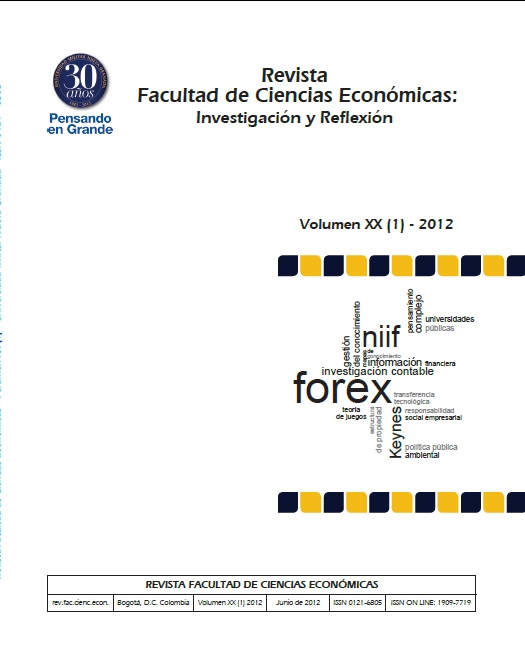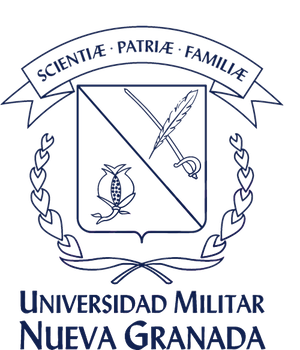Fishing social dilemmas in colombian pacific ocean: a analysis from game theory
Abstract
This paper focuses on the social rules study of the population that works in fishing activities in Colombian pacific ocean. For such effect, a non-cooperative game is established with imperfect complete information among the zone of fish producers community and owners of collection centers, which responds to the assumptions of agents' rational choice, from neoclassic school. The contribution of this paper is to characterize and model the phenomenon of direct trade of species from illegal fishing; within a methodological framework of game theory, and contrast the conditions of a Nash Equilibrium for such strategic interaction.Downloads
References
Arrow, K. (1951). Alternative approaches to the theory of choice in risk-taking situations. Econometrica, 19:404-437.
Arroyo, S., Alegría, A., & Bustamante, D. (2009). Economía del crimen y teoría de juegos: un modelo teórico del intercambio directo de drogas ilegales a pequeña escala. Anales de la Asociación Argentina de Economía Política. Disponible en: http://www.aaep.org.ar/anales/works/works2009/arroyo.pdf.
Baland, J. & Platteau, J. (1997). Coordination problems in local-level resource management. Journal of Development Economics, 53(1):197-210.
Becker, G. S. (1968). The Crime and Punishment: An Economic Approach. Journal of Political Economy, 76(2):169-217.
Bowles, S. (2008). Review of Microeconomics: Behavior, Institutions, and Evolution. Journal of Socio-Economics, 37(1):444-447.
Bowles, S. & Gintis, H. (2002). Social capital and community governance. Economic Journal, 112:419-436.
Brock, W. & Durlauf, S. (2001). Discrete Choice with Social Interactions. Review of Economic Studies, 68:235-260.
Cárdenas, J. (2003). Real wealth and experimental cooperation: Evidence from field experiments. Journal of Development Economics, 70 (2):263-289.
Cárdenas, J., Maya, D., & López, M. (2003). Métodos experimentales y participativos para el análisis de la acción colectiva y la cooperación en el uso de recursos naturales por parte de comunidades rurales. Departamento de Desarrollo Rural y Regional. Facultad de Estudios Ambientales y Rurales. Pontificia Universidad Javeriana.
Cárdenas, J., Maya, D., & López, M. (2002). Manglares, comunidad y cooperación. Pontificia Universidad Javeriana. WWF Colombia. Colgrafics Ltda.
Cárdenas, J. & Ostrom, E. (2004). What do people bring into the game: experiments in the field about cooperation in the commons. Working papers 32, International Food Policy Research Institute (IFPRI), 32.
Casas, A., Cortez, D., & Gamboa, L. (2003). Las comparaciones interpersonales y la evaluación de estados sociales alternativos. Revista Economía Institucional, 5 (08):147-160.
Ehrlich, I. (1996). Crime, Punishment, and the Market for Offenses. The Journal of Economic Perspectives, 10(1):43-67.
Elbers, C., Lanjouw, P, Mistiaen, J., Ôzler, B., & Simler, K. (2004). On the Inequal Inequalities of Poor Communities. The World Bank Economic Review, 18(3) Oxford, Reino Unido: Oxford University Press:401-421.
Hansen, L.-G., Jensen, F., Brandt, U.-S., & Vestergaard, N. (2006). Illegal landings: an aggregate catch self-reporting mechanism.American Journal Agricultural Economics, 88(4):974-985.
Hardin, G. (1968). The tragedy of the Commons. Science, 162:1243-1248.
Harsanyi, J. (1955). Cardinal Welfare, Individualistic Ethics, and Interpersonal Comparisons of Utility. The Journal of Political Ecomomy, 63:309-321.
Hatcher, A., Jaffry, S., Thebaud, O., & Bennett, E. (2000). Normative and Social Influences Affecting Compliance with Fishery Regulations. Land Economics, 76 (3):448-461.
Jensen, F. y Vestergaard, N. (2000). Moral Hazard Problems in Fisheries Regulation: The Case of Illegal Landings. Society, Economics and the Environments, 9:7-19.
Milliman, S. (1986). Optimal Fishery Management in the Presence of Illegal Activity. Journal of Environmental Economics and Management, 13:363-387.
Neumann, V & Morgenstern, O. (1947). Theory of Games and Economic Behavior. Princenton University Press.
Nussbaum, M. & Sen, A. (1996). La calidad de vida. The United Nations University.
Ostrom, E. (1990). Governing the Commons: The Evolution of Institutions for Collective Action. Cambridge.
Ostrom, E. (2000). El gobierno de los comunes. Fondo de Cultura Económica.
Ostrom, E., Gardner, R., & Walker, J. (1994). Rules, Games, and Common-Pool Resources. Ann Arbor.
Rodriguez-Sickert, C., Guzmán, R., & Cárdenas, J. (2008). Institutions influence preferences: Evidence from a common pool resource experiment. Journal of Economic Behavior & Organization, 67:215-227.
Sen, A. (1988). The Concept of Development. In Handbook of Development Economics. Cap. I, Vol. I, Amsterdam, North Holland.
Sugden, R. (1984). Reciprocity: The Supply of Public Goods through Voluntary Contributions. Economic Journal, Royal Economic Society, 94(376):772-787.
Trisak, J. (2005). Applying game theory to analyze the influence of biological characteristics on fishers cooperation in fisheries co-management. Fisheries Research, 75:164-174.











